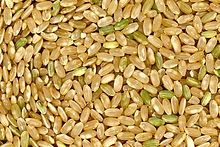|
|
| |
|
|
| |
|
|
|
|
| |
 |
| The food we eat
comes directly or indirectly from plants such as
rice. |
Botany
Botany, also called plant science(s), plant biology or
phytology, is the science of plant life and a branch of
biology. A botanist, plant scientist or phytologist is a
scientist who specialises in this field. The term
"botany" comes from the Ancient Greek word βοτάνη (botanē)
meaning "pasture", "herbs" "grass", or "fodder"; βοτάνη
is in turn derived from βόσκειν (boskein), "to feed" or
"to graze". Traditionally, botany has also included the
study of fungi and algae by mycologists and phycologists
respectively, with the study of these three groups of
organisms remaining within the sphere of interest of the
International Botanical Congress. Nowadays, botanists
(in the strict sense) study approximately 410,000
species of land plants of which some 391,000 species are
vascular plants (including approximately 369,000 species
of flowering plants), and approximately 20,000 are
bryophytes.
Botany originated in prehistory as herbalism with the
efforts of early humans to identify – and later
cultivate – edible, medicinal and poisonous plants,
making it one of the oldest branches of science.
Medieval physic gardens, often attached to monasteries,
contained plants of medical importance. They were
forerunners of the first botanical gardens attached to
universities, founded from the 1540s onwards. One of the
earliest was the Padua botanical garden. These gardens
facilitated the academic study of plants. Efforts to
catalogue and describe their collections were the
beginnings of plant taxonomy, and led in 1753 to the
binomial system of nomenclature of Carl Linnaeus that
remains in use to this day for the naming of all
biological species.
In the 19th and 20th centuries, new techniques were
developed for the study of plants, including methods of
optical microscopy and live cell imaging, electron
microscopy, analysis of chromosome number, plant
chemistry and the structure and function of enzymes and
other proteins. In the last two decades of the 20th
century, botanists exploited the techniques of molecular
genetic analysis, including genomics and proteomics and
DNA sequences to classify plants more accurately. |
|
|
Branches of Botany |
- Agronomy—Application of plant
science to crop production
- Bryology—Mosses, liverworts, and
hornworts
- Forestry—Forest management and
related studies
- Horticulture—Cultivated plants
- Micropaleontology—Pollen and spores
- Mycology—Fungi
- Paleobotany—Fossil plants
- Phycology—Algae
- Phytochemistry—Plant secondary
chemistry and chemical processes
- Phytopathology—Plant diseases
- Plant anatomy—Cell and tissue
structure
- Plant ecology—Role of plants in the
environment
- Plant genetics—Genetic inheritance
in plants
- Plant morphology—Structure and life
cycles
- Plant physiology—Life functions of
plants
- Plant systematics—Classification and
naming of plants
|
|
|
Notable botanists |
- Ibn al-Baitar (d. 1248), Andalusian-Arab
scientist, botanist, pharmacist, physician, and author
of one of the largest botanical encyclopedias.
- Georges-Louis Leclerc, Comte de
Buffon (1707–1788) was a French naturalist who held the
position of Intendant of the Jardin du Roi ('King's
Garden'). Buffon published thirty-five volumes of his
Histoire naturelle during his lifetime, and nine more
volumes were published after his death.
- Luther Burbank (1849–1926), American
botanist, horticulturist, and a pioneer in agricultural
science.
- Charles Darwin (1809–1882) wrote
eight important books on botany after he published the
Origin of Species.
- Al-Dinawari (828–896), Kurdish
botanist, historian, geographer, astronomer,
mathematician, and founder of Arabic botany.
- Conrad Gessner (1516–1565) was a
Swiss naturalist and bibliographer.
- Joseph Dalton Hooker (1817–1911),
English botanist and explorer. Second winner of Darwin
Medal.
- Carl Linnaeus (1707–1778), Swedish
botanist, physician and zoologist who laid the
foundations for the modern scheme of Binomial
nomenclature. He is known as the father of modern
taxonomy, and is also considered one of the fathers of
modern ecology.
- Gregor Mendel (1822–1884),
Augustinian priest and scientist, and is often called
the father of genetics for his study of the inheritance
of traits in pea plants.
- John Ray (1627–1705) was an English
naturalist, the father of English natural history.
- G. Ledyard Stebbins (1906–2000) was
an American botanist and geneticist. He was one of the
leading evolutionary biologists of the 20th century.
- Eduard Strasburger (1844–1912) was a
Polish-German professor who was one of the most famous
botanists of the 19th century.
- Nikolai Vavilov (1887–1943) was a
Russian botanist and geneticist. He showed how and where
crop plants evolved. He studied and improved wheat,
corn, and other cereal crops.
|
|
|
|
|
|
|
|
|
|
|
|
|
|
|
|
|
|
|
Search Fun Easy English |
|
|
|
|
|
|
|
|
|
|
|
|
|
|
|
About
Contact
Copyright
Resources
Site Map |